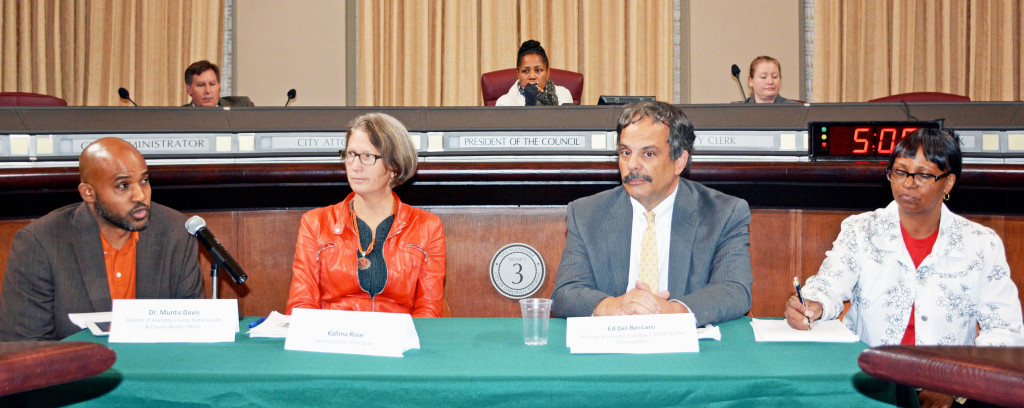Oakland Residents Push City Council to Protect Renters and Homeowners Who Are Being Driven from the City
Oct 4, 2015
Posted in Affordable Housing, Economic Development, Gentrification, Housing/Foreclosures, Oakland Job Programs, Restorative Justice

By Ken Epstein
Angry, desperate and determined residents filled city council chambers Wednesday evening for a public hearing that had been called to discuss Oakland’s housing crisis, demanding that councilmembers move beyond talk to take immediate action to protect them from the runaway housing market that is driving Oaklanders from their homes and the city.
Pressured by speaker after speaker and some on the council, councilmembers ultimately voted unanimously to adopt an action roadmap that will provide a framework for them to deal with many aspects of the crisis.
Tenants spoke about rents being raised and being evicted after decades in the same apartment. A few said they were already packed and preparing to move out of the city.
A woman talked about losing her home and being forced to live in her car, while one man said that he has been fighting illegal rent increases and landlord harassment for five years.
The focus of the hearing was a document called “A Roadmap Toward Equity: Housing Solutions for Oakland, California,” a comprehensive set of proposals to protect residents from displacement and to build more housing that Oakland’s low- and moderate-income residents can afford.
The plan was developed by city staff and the nonprofit organization PolicyLink after 18 months of research, examining what other cities are doing and evaluating the experiences of existing City of Oakland policies, programs and laws.
The roadmap’s many proposals include strengthening code enforcement to require landlords to maintain their units in habitable condition, a rent control ordinance to replace the existing one that tenants’ rights supporters consider ineffective and free legal support for the thousands of tenants who are evicted each year, often illegally.
Housing activists told a Post reporter that they were happy the document had passed but saw the unanimous vote as a small first step – the priorities in the plan have yet to be adopted.
While the council is sounding like it is willing to fight for residents, many of the housing activists are concerned that the council as a whole does not have a good track record on protecting tenants or assuring that new projects require developers to build affordable housing units.
Over the last decade, the City Council has repeatedly failed to muster the five votes needed to pass a number of the ordinances and policies that are now in the road map.
The council has repeatedly voted to support developers with little or no guarantees of affordable housing. Ordinances are passed frequently that have no budget to pay for staff to implement or enforce them.
Sometimes, staff failed to implement council decisions.
Councilmember Desley Brooks underscored the urgent need to take immediate and decisive council action.
Brooks proposed a motion for the full council to discuss and vote to fund a program to provide for rapid housing relocation money for tenants who are evicted and to help low-income home owners with loans to pay for code violations and retrofits.
The funds would also pay for outreach to support the enforcement of the city’s minimum wage ordinance.
Brooks’ motion, jointly seconded by Councilmembers Dan Kalb and Rebecca Kaplan, will be discussed by the full council on Oct. 20.
Brooks also called on the council to take steps to guarantee that the city signs contracts with local businesses that hire Oakland residents.
“We can look at our contracting process and give Oaklanders contracts,” she said. “We have to save ourselves. We have to grow businesses in our communities.”
Brooks said the roadmap contains many proposals that can make a difference in the coming years, but the council needs to focus first on those that can be done right away.
“We have to look at how we can assist people staying in place,” she said.
“We have everything we need, right now, right here in order to address this problem,” Brooks said. “We don’t have the luxury of working on one thing at a time. We have to work on many things at the same time.”
Kaplan said the council should look at steps right away to relieve the plight tenants are facing.
“We have people kicked out of their homes today, many in ways that are illegal,” she said. “We have a relocation assistance ordinance that is not effective – it is confusing.”
The city can make the ordinance more consistent with a high enough dollar amount to make sure it really helps people with their relocation expenses, she said.
In addition, she said, landlords can be required to pay $5,000 to $10,000 per unit for tenant relocation. Such fees would discourage landlords from evicting tenants to re-rent apartments at a higher rate.
Mayor Libby Schaaf, in a statement released Wednesday, discussed the work of the mayor’s housing cabinet, which she formed to propose concrete steps to deal with the crisis.
“I am working on strategies to immediately stabilize neighborhoods and protect existing residents by converting market-rate housing to affordable, as well as longer-term measures to build new housing at all income levels,” she said.